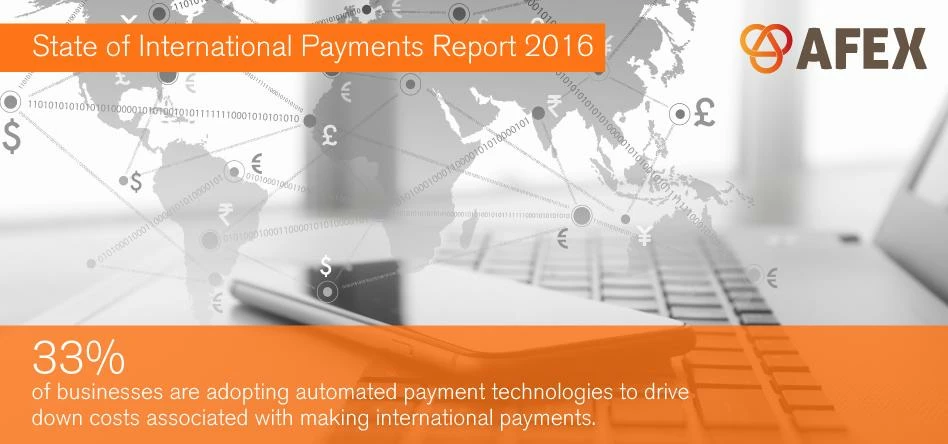
Partner Article
International Trade Growth Spurs Automated Payments Systems Uptake
Automated Payments Systems in High Demand as UK Businesses Anticipate International Trade Growth
- Nearly half (44%) of respondents expect to increase international payments in 2016, with 17% planning to deploy automated systems
AFEX, one of the world’s largest non-bank providers of global payment and risk management solutions, today announced the results of its inaugural State of International Payments Report, finding that nearly half (44%) of UK companies engaged in international commerce expect to utilise international payments more this year than in 2015. As a result, around one in six companies (17%) are planning to start using or upgrade their online automated international payments tools in the next 12 months to increase operational efficiency, mitigate risk and reduce costs.
Globalisation & Increasing International Focus
AFEX’s first annual State of International Payments Report, which polled more than 500 financial decision makers at SMEs and corporations from across the globe who engage in an estimated $230 million worth of international transactions per month, reveals that despite uncertainty in global markets, these firms anticipate faster growth in international markets than domestic.
Online marketplaces, such as eBay and Amazon, have brought international commerce within reach of smaller businesses, while mobile payments have opened up access to previously untapped and under-banked markets. Furthermore, a fall in the value of the pound since the EU referendum is making UK exports more attractive to foreign buyers. Against this backdrop, 44% of the UK firms surveyed expect to increase their international payments this year, compared to 31% that expect to see a commensurate rise in domestic payments.
This greater weighting given to international payments brings with it greater complexity, with FX volatility (62%), cost (24%) and ensuring payments are made correctly (22%) all high on the list of challenges.
The data support the findings in a report* from the McKinsey Global Institute, which asserts that almost all cross-border commerce now entails a digital component. Increased data flow, expected to rise nine-fold over the next several years according to the report, will enable more rapid movement of goods, services and financial transactions.
“It’s never been easier for UK businesses to trade internationally and despite uncertainty over the UK’s trade agreements following the Brexit vote, many are optimistic about growing their exposure to international markets,” said AFEX Chief Executive Officer, Jan Vlietstra. “Handling higher volumes of more complex international payments brings with it a new set of challenges, however, and as firms scale their business overseas they need to be aware of currency exchange risks and the associated costs and complexities involved when dealing with different banking systems. Automated payments solutions, coupled with currency exchange, FX products and expert advice, can help mitigate these risks.”
Enhanced Efficiency
Over half (51%) of the UK firms surveyed said that ease was their single biggest consideration when it comes to making payments internationally and against the anticipated increase in international payment volumes, it is unsurprising that 17% of the UK firms surveyed plan to introduce or enhance their automated payment technologies this year. Two in five (40%) of these said reducing the amount of time they spend processing payments was a key reason for turning to automation, with the same number eyeing reduced costs as a main driver. A quarter (27%) are adopting automated payments technologies to be able to make and receive payments in real-time.
“Importers and exporters want to be able to focus on growing their business while keeping their overheads to a minimum and many are turning to automated payment systems as a result,” noted Stuart Holmes, General Manager EMEA at AFEX. “Increasing globalisation means greater competition and payments is one obvious area where firms can cut costs, save time, improve service and manage their exposure to international markets more effectively.”
Counting the Cost of International Payments
Over the last 12 months, nearly half (45%) of those UK businesses surveyed have experienced FX volatility when making or receiving international payments while 14% have experienced a delay in receiving payment. One in 10 (10%) had an international payment fail or get lost while transferring and 6% experienced fraudulent activity.
Of those that experienced issues when transacting business internationally, 41% saw profitability hit.
* McKinsey Global Institute, Digital Globalization: The New Era of Global Flows, February 2016
About the survey
AFEX polled clients based in the United States, Canada, the United Kingdom and Australia, and across a range of industries, to determine their perspectives on payments. The survey was conducted from Thursday, July 28th, through Friday, August 12th, with 513 respondents in total and 148 from the UK. Please visit https://www.afex.com/docs/AFEX_State_of_International_Payments_2016.pdf to view the full results.
This was posted in Bdaily's Members' News section by AFEX .
Enjoy the read? Get Bdaily delivered.
Sign up to receive our popular morning National email for free.








 Raising the bar to boost North East growth
Raising the bar to boost North East growth
 Navigating the messy middle of business growth
Navigating the messy middle of business growth
 We must make it easier to hire young people
We must make it easier to hire young people
 Why community-based care is key to NHS' future
Why community-based care is key to NHS' future
 Culture, confidence and creativity in the North East
Culture, confidence and creativity in the North East
 Putting in the groundwork to boost skills
Putting in the groundwork to boost skills
 £100,000 milestone drives forward STEM work
£100,000 milestone drives forward STEM work
 Restoring confidence for the economic road ahead
Restoring confidence for the economic road ahead
 Ready to scale? Buy-and-build offers opportunity
Ready to scale? Buy-and-build offers opportunity
 When will our regional economy grow?
When will our regional economy grow?
 Creating a thriving North East construction sector
Creating a thriving North East construction sector
 Why investors are still backing the North East
Why investors are still backing the North East